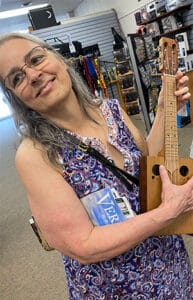Have you always wanted to learn an instrument? Maybe you’ve dreamed of being able to play and sing along, or play with a group. Maybe you’re like me and dabbled in several instruments but struggled to really become a musician. I’m the Pied Piper of baritone ukuleles, so yes, I’m partial, but I think baritone uke is your solution!
Baritone ukulele is ideal for players who don’t have time for a steep learning curve, because baritone uke is easy to learn.
Baritone Uke Is Easy for Beginners
For beginners, your brain is going to be very busy processing a lot of new information all at once. The left hand is doing something completely different from the right. Meanwhile you’re thinking about rhythm and keeping the beat, you’re thinking about which chord comes next, you’re thinking about the words, if you’re a singer, and what they mean to you. Meanwhile you’re trying not to think about feeling nervous, but your fight or flight response may be kicking in anyway. Baritone ukes make it easier to manage all this parallel processing.
Some of the most common baritone uke chords require only one or two fingers on the frets, so you can start singing along with a simple song in your first hour. Granted, if you’ve never played music before, you won’t be ready for prime time just yet. But you can get up and running quickly and start having fun right away.
Yet baritone uke can offers musical challenges for a lifetime of playing. You might want to start out with simple folk or pop songs, or hymns, and later move on to rhythm and blues, rock, jazz, and even classical.
Baritone uke is the easiest chordal instrument—meaning it plays chords rather than single notes like a sax—that you can sing along with. Harmonica is a chordal instrument that may be considered easier than baritone ukulele, but I don’t think you’ll have much luck trying to sing along while playing your harmonica.
Related Topic
Want to know which ukulele brands offer baritone ukes? I scoured the internet and created a directory of all the brands I could find that make baritone ukes, and I added pictures of the head stocks and links to the manufacturer websites: Baritone Ukulele Brands and Builders Directory.
Baritone Uke Is a Lot Easier than Guitar
Lots of people make a stab at learning guitar, thinking it can’t be that hard to just strum a few chords and sing along. But guitar requires a considerable time investment just to get that far.
Why is baritone ukulele so much easier than guitar?
| Baritone Ukulele | Guitar | |
| Number of Strings | Four strings means that you never have to think about more than four notes at once. | Six strings means 50% more strings to think about at once. |
| Strumming | You can always strum all four strings at once (although advanced players may choose otherwise). | Many chords require one or more strings to be muted or not strummed while other strings are strummed. Even the most basic chords require muting or not strumming one or more strings. |
| Chords | Each chord has four and only four notes. | Chords vary from 3-6 notes each. |
| Strumming Patterns | Learn a basic strumming pattern then put your strumming hand on “auto pilot” so you can focus on your fretting hand. | Strumming hand always has to consider which strings should be strummed at any give stroke. |
| String Material | Nylon strings are softer, making them easier to fret, easier to strum. | Steel strings* are sharp and cut into beginner fingertips, meaning practice times are shorter and calluses must be tougher. |
| String Tension | Nylon strings have lower tensions which requires less finger strength and less hand strength, making the instrument easier for those who have small hands or less hand strength. | Steel strings have higher tension and require more hand and finger strength. |
| Calluses | Calluses are quicker and easier to develop on nylon strings, and they last longer if you don’t play for a while. Playing is less painful as a beginner. | You’ll need tougher calluses that take longer to develop, and if you don’t play for a while, you notice a big difference. Playing hurts more for beginners or those who haven’t played recently. |
| Percussive Techniques | Percussive techniques are easier to learn and to experiment with because nylon strings are less painful. | Harder, sharper steel strings makes percussive techniques more challenging. |
| Size and weight | Baritone ukes are about 75% the size and weight of a full-size guitar like a dreadnought, and about 80%-85% the size of the smaller parlor guitar. They weigh around two pounds. | Up to six pounds (2.8 kg) in weight and 42″ (107 cm) in overall length. |
| Singing, Playing, and Learning Songs | Baritone uke is essentially a simplified guitar. In a way, it’s like using two hands to play the right-hand part of piano piece. | Guitar difficulty is equivalent to piano. |
Most players who want to become a virtuoso artist are probably going to choose guitar over baritone uke because they are basically the same instrument but guitar has more notes and a bigger body with more volume and resonance. (The same is not true of traditional Hawaiian ukuleles because they are tuned differently and have a different sound than guitar.) Similarly, virtuoso keyboard artists are probably going to want the 88 keys of a full-size piano.
Players who want a quick start and quicker progress will love the easier baritone uke.
Related topic
How do baritone ukulele chords differ from other stringed instruments?
Is Baritone Ukulele Easier than Tenor, Concert, or Soprano Ukulele?
There is one factor that I think makes baritone uke a little easier than the traditional Hawaiian uke (tenor, concert, soprano), especially as you begin to learn the language and structure of music.
The baritone ukulele strings go from low to high, from top (closest to your head) to bottom (closest to your feet), which is called linear tuning. The strings of the traditional Hawaiian uke start with the highest note (closest to your head), then drop to the lowest note of the instrument, then continue up in pitch on the next two strings. This type of tuning is called re-entrant tuning.
This difference in tuning is what gives traditional ukes that island sound versus baritone ukes having the guitar-like sound.
Re-entrant tuning doesn’t make the instrument any harder to learn per se. You can be up and running on traditional uke just as quickly as on baritone uke. For strumming and singing along, there is really no difference in difficulty. But for those who are learning about notes, scales, how chords are built, and so on, I would say that linear tuning is a little easier for beginners.
Linear tuning is also a little easier for those who have some background in other instruments with linear tuning, such as piano, violin, etc., and for those who read music notation. It can be a little confusing at first to think of notes as being “out of order.”
Some players think baritone is a little easier than traditional ukes because the neck is wider, making the strings a little farther apart, and the scale length is longer, making the frets farther apart. This additional space can make it easier to form chords with your fretting hand because your fingers are less crowded.
Baritone Uke Is Easy for Travelers
On the road again? Baritone uke is not too big, not too small… just right for road trips, campers, RVers, and beach days. In fact, the reason I started playing bari uke in the first place was a road trip to see the Great American Eclipse in the summer of of 2017. The piano just wouldn’t fit in the Prius.
Although the eclipse totality lasted less than three minutes, we managed to make the road trip last thirty days. So I decided to borrow a family uke. My partner, a pro pianist, brought a melodica.
Little did I know at the time how much the humble baritone uke would change my life. I used to be a dabbler in various instruments. Now I’m a musician. I can jam!
For air travelers, be advised that baritone ukes may not fit in the overhead bins. The outside width of a baritone ukulele hard case is 33″ to 36″ (one meter). They fit in the bins of large aircraft but definitely not in smaller planes. If you want to fly often with your uke, you may want to consider a traditional uke in a small size, ie concert or soprano.
Baritone Uke is Easy for Singers and Songwriters
A budding singer-songwriter has a ton of skills to train all at the same time. Your brain is rarely going to be processing as many complex parallel tasks as when you’re working on an original song. Talk about multi-tasking. You’re thinking about the words, how you want to craft them, the story that you’re telling, the sentiments you want to express. You’re thinking about singing and what you need to do with your voice. You’re thinking about the emotions you want people feel and what the story means to you. You’re thinking about the chords you need play, the rhythm you need to strum, the beat you need to keep, the melody and how the words and melody fit together. You’re thinking about what you want to change or fix or improve about the song.
And, if you’re performing, you’re thinking about the audience, entertaining them, reading their reactions, and responding to them. Plus you’re probably nervous and using some brain space to consciously control your nerves.
It’s no wonder that many singers aren’t instrumentalists. But if you’re looking for the easiest instrument to write songs with, and sing along with, baritone uke is for you.
Baritone Uke Is Easier for People with Stage Fright
Is there anything worse than the terror of stage fright? It kept me out of the limelight for years. It just made performing music not fun. One of my biggest musical goals is to get enough experience that when I have dreams about playing music it just seems like a normal everyday thing and not a reason to feel terrified!
For me, the more I understand music, the more I understand what I’m doing, the more confidence I have, and the less fear. So it makes sense that an easier instrument gives me more confidence.
Learning an instrument is tremendously helpful for singers who have stage fright. Even if you don’t play the instrument on stage, playing off stage will help you understand music better and help you communicate better with the band, making you feel more confident.
That added confidence may be just what you need to overcome crippling state fright.
Baritone Ukulele is Easier for Multi-Instrumentalists
Baritone ukulele is ideal for players who are multi-instrumentalists and want to add a strumming instrument to their arsenal. Pianists, percussionists, and horn players can learn to double on rhythm “guitar” without a huge time investment.
There are many great songs you can play with only three or four chords, and if you stick to the key of G major (E minor), you can be rocking the rhythm in short order.
Baritone Uke Is Easier for Adults and Seniors
Yes, it’s easier to learn music as a child. It’s easier to learn almost anything as a child. So maybe you won’t become Hendrix or Segovia. But you can learn enough to experience the joy of jamming. You can learn enough to experience the elation of playing songs with other musicians.
Music is all about repeating patterns, and many songs are built with easy patterns that repeat again and again. Combine these easy songs with an easy instrument, and you’re flying.
Personally, I don’t have time for a steep learning curve as an instrumentalist. I make time for my music, but my time budget includes songwriting, singing, playing with friends and family, and creating my resources that I share on this site, as well as working on repertoire, technique, theory, and ear training. I’m improving steadily, but meanwhile, I want to jam.
Baritone uke is ideal for me because I started late on stringed instruments. Very late. Because it is essentially a simplified guitar, bari uke lets me do so much more in much less time. Yet, the instrument can take you as deep you like into music.
While the middle years of life tend to be the busiest, in later years we may be looking for ways to fill up extra time. Both stages are life are great for baritone uke.
By the way, if you fear that you’ve killed off one too many brain cells over the years, fear not. The cognitive benefits of playing an instrument are well known, as are the benefits to social and emotional well being. Baritone uke is learnable, and it will provide excellent exercise to keep your gray matter fighting fit, and even to recover some lost function if that has occurred.
“It has been hypothesized that the act of playing music requires many brain systems to work together, such as the hearing, motor and perception systems,” says Dr. Bernhard Ross, senior scientist at Baycrest’s Rotman Research Institute and medical biophysics professor at the University of Toronto. In one study, “we saw direct changes in the brain after one session, demonstrating that the action of creating music leads to a strong change in brain activity.”
I made a five-year plan to become a musician, and it doesn’t matter what age I started or what age I’ll be in five years. As Stephen Stills said in Thoroughfare Gap, “It’s no matter your distance; it’s the ride.”
Baritone Uke is Easier for Small Hands or Weak Hands
Four strings instead of six, nylon instead of steel strings, lower string tension, smaller size. The baritone uke is easier to manage physically than larger instruments. Many physical problems can affect our hands at different times in life. If your doctor has given you the go ahead to exercise your hands, baritone uke is perfect.
Baritone Uke Is Easier for Kids and Busy Teens
Kids and teens find baritone uke easy for the same reasons as adults. It’s easy to manage physically, and the results are faster. The faster results means young people stick with it more too.
Baritone Uke Is Easier for Anyone Who Wants a Quicker Way to Make Real Music.
Baritone uke is not only easy to learn, it’s easy on the wallet too. So if you’ve always wanted to play an instrument but never found the time to learn or worried about the cost, you owe it to yourself to try a baritone uke. You won’t regret it!



0 Comments